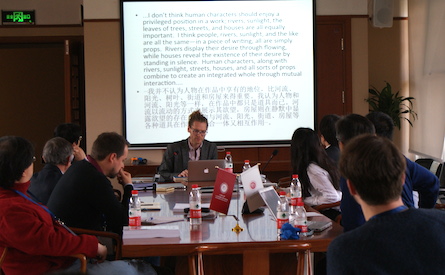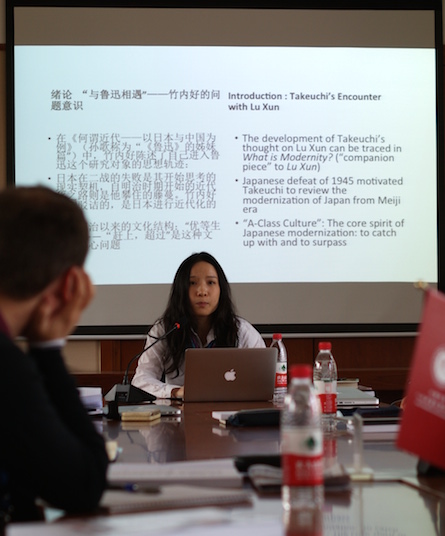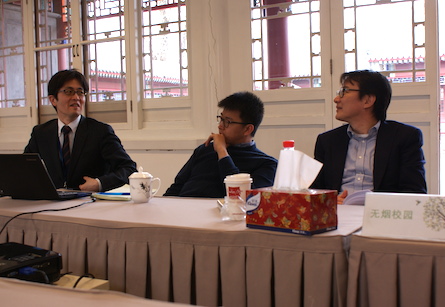[Report] PKU-UTokyo Spring Institute 2017 (5)
Report on 18th March 2017
Saturday’s morning session saw the beginning of the institute’s Junior Scholar Workshop, with two younger participants presenting their research to be critiqued and complimented by the professors present. The session started with a stimulating presentation from Todd Foley entitled “A Posthuman Worldview in Yu Hua’s Fiction”. Through a close reading of the Chinese novelist Yu Hua’s To Live and an extensive discussion of the novel’s use of animal and scatological imagery, Mr. Foley formulated a convincing argument for the necessity of confronting the seemingly unpleasant or offensive state of animality in order to truly understand what it means to be a ‘human’. Through reinterpreting ‘human’ through the lens of the animal or animality, we can then begin to think of what types of new human (‘post-human’) society could be possible with this reinterpretation.
One of the most interesting themes discussed by Mr. Foley was this pervasive sense of a categorical ‘levelling’ that might accompany the emergence of the post-human. The world-ordering and world-rationalizing discourses of modernity seek to create distinct categories into which the varied aspects of the world can be definitively placed. ‘Human’ is a particularly important category here: the rational, thinking being that must, by necessity, exist as a distinct category apart from and above a world it wishes to observe, comprehend and catalogue. As Mr. Foley described, Yu Hua presents a decisive critique of this notion through collapsing categories of animal and human together in imagery and behavior. Breaking down these distinctions (or more correctly, hierarchies) highlights an inherent ‘equality of things’, a fundamental equality in substance. The political implications of this are clear, pointing towards a more fundamentally equal post-human society and civilization that supplants the clearly defined ontological and social hierarchies of contemporary capitalist society. As Professor Xudong Zhang commented, to live as an animal can, in some sense, be a means of preserving your humanity.
Xing Cheng was the second young scholar to present, giving a lecture entitled “How to Overcome Modernity? A Critical Study on Takeuchi Yoshimi’s Research on Lu Xun”. Ms. Cheng pointed to Japan’s defeat in 1945 as prompting the prominent Japanese Sinologist Takeuchi Yoshimi to review the course of Japanese modernization and the meaning of modernity in the Japanese context. According to Ms. Cheng, Takeuchi saw the essence of Japanese modernity as an ‘honor student mentality’ that constantly sought to catch up with its competitors and surpass them. This stems from Japan’s material embrace of European modernity without an accompanying moral or cultural foundation, a process which led to the loss of Japanese subjectivity and the eventual blossoming of Japanese fascism.
In comparison, Ms. Cheng argued, Takeuchi saw China as a country that sought to preserve its subjectivity through reforming old ways rather than abandoning them. Thus, where Japan is an evolving culture, China is a culture that constantly returns to the heart or develops around an axis/anchoring point (回心). Lu Xun’s writings mirror this characteristic, where the old is constantly reborn as the new without ever being wholly destroyed. Like our previous discussions on plural modernities and diversities of development, Ms. Cheng’s presentation raised significant points about how we might conceptualize development and civilization outside of the hegemonic, single-trajectory narratives of modernity.
Finally, the afternoon session saw Professor Masaaki Takeda give an incredibly fascinating lecture entitled “Curiosity and Credulity: George Psalmanazar’s The Description of Formosa and the Problem of Cultural Representation”. Professor Takeda framed a reading of the 18th century oddity The Description of Formosa through a highly inventive application of Eduardo Viveiros de Castro’s Cannibal Metaphysics, an anthropological text. This latter text posits that certain primitive societies lack interiority, and thus can only recognize themselves through the act of cannibalism – the visceral act of eating the other and, more importantly, identifying as the other, the eaten. The subject only comes to be itself outside itself.
In terms of The Description of Formosa, Professor Takeda argued for the existence of a suppressed cannibal metaphysics in the lurid and entirely imagined descriptions of Formosa. Here, the existence of such a cannibal underworld is necessary to give the self (the non-cannibal, in this case the English reading public) meaning. More broadly, this is connected to a latent cannibalism in modern civilization, where the very parameters of civilization (and indeed, the whole system of representation itself) can only be defined through the existence and acknowledgement of a barbaric other perspective. Linking nicely with the day’s first presentation, we find that the barbarian gives civilization meaning only when we understand how to be that barbarian.
Felix Eugene Borthwick (The University of Tokyo)









